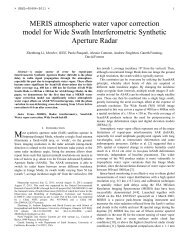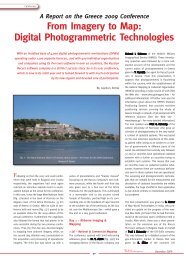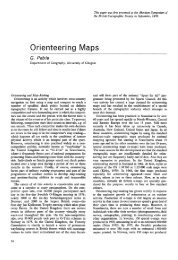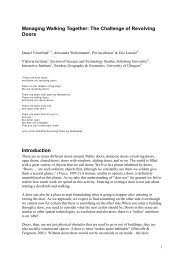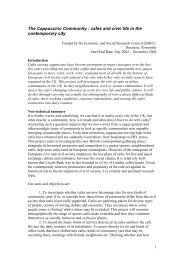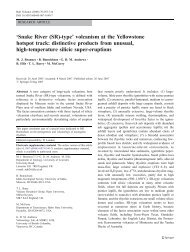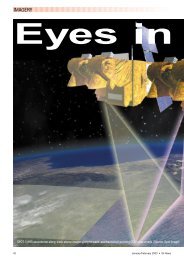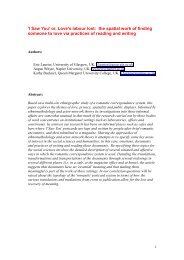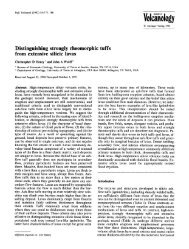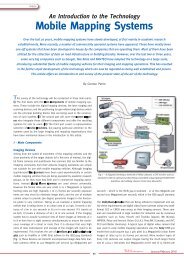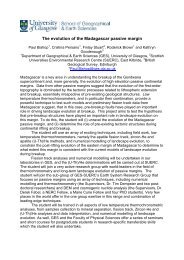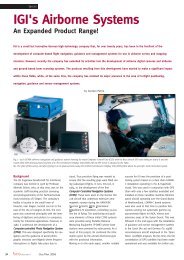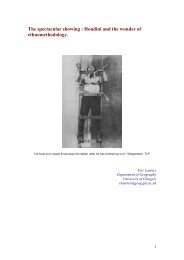Café Ethnography : the uses of tables and chairs
Café Ethnography : the uses of tables and chairs
Café Ethnography : the uses of tables and chairs
You also want an ePaper? Increase the reach of your titles
YUMPU automatically turns print PDFs into web optimized ePapers that Google loves.
Closing Remarks<br />
<strong>Café</strong> <strong>Ethnography</strong>:<br />
Returning to <strong>the</strong> questions raised by <strong>and</strong> for <strong>the</strong> Living Memory project: firstly,<br />
whe<strong>the</strong>r cafés were less rule bound <strong>and</strong> looser arenas <strong>of</strong> action than workplaces <strong>and</strong><br />
secondly, whe<strong>the</strong>r people had greater freedom to 'play' with <strong>the</strong>ir social roles in such<br />
places. It is worth noting firstly that recent work on organisations in action has<br />
observed that <strong>the</strong>y run in an informal mode most <strong>of</strong> <strong>the</strong> time (Boden 1994), <strong>and</strong><br />
reflexive play with social roles is actively encouraged in many workplaces (Adkins<br />
1998; Crang 1997). Fur<strong>the</strong>r, although customers in cafes do not have to do <strong>the</strong> kinds<br />
<strong>of</strong> complex articulation work which typically characterises <strong>the</strong> organisational settings<br />
investigated by ethnographers (Schmidt 1994), customers attending cafés are still<br />
required to engage in <strong>the</strong> socio-material ordering <strong>of</strong> <strong>the</strong> places <strong>of</strong> which <strong>the</strong>y are<br />
(passing) members (i.e. by not reserving <strong>tables</strong> when it is busy, carrying <strong>the</strong>ir drinks<br />
to <strong>the</strong>ir <strong>tables</strong>, making <strong>the</strong>ir plates & cutlery look ready for collection by <strong>the</strong> staff,<br />
sharing <strong>tables</strong> graciously when <strong>the</strong> café is busy etc.). 'Informality' comes with<br />
normative expectations as much as formality does, <strong>and</strong> to ignore <strong>the</strong>m is to invite<br />
assessments <strong>of</strong> one's social competence, lack <strong>of</strong> manners, character, sanity etc. In<br />
'open regions' according to G<strong>of</strong>fman (1963), such as cafés <strong>and</strong> bars, many <strong>of</strong> <strong>the</strong><br />
changed norms are to do with behaviour towards strangers in terms <strong>of</strong> deference <strong>and</strong><br />
status, whereby hierarchies are played down to some extent. Each person in a café <strong>of</strong><br />
bar is ideally <strong>the</strong> social equal <strong>of</strong> one ano<strong>the</strong>r. The common knowledge that we have<br />
underlined in this article is that we are not all 'strangers' to one ano<strong>the</strong>r in public<br />
spaces <strong>and</strong> in a place such as a café organise ourselves into staff, regular customers,<br />
new customers, table sharers etc. As incumbents <strong>of</strong> <strong>the</strong>se categories we also shift<br />
between <strong>the</strong>m according to sequenced actions. It is not only human role players that<br />
shift categories since we have also underlined <strong>the</strong> changing significance <strong>of</strong> artefacts<br />
such as <strong>tables</strong>, doors, cutlery <strong>and</strong> coats.<br />
Even without doing comparative studies <strong>of</strong> o<strong>the</strong>r cafés we can say that by <strong>the</strong> same<br />
means that <strong>the</strong> Flaming Cup was assembled as a neighbourhood café or (Wakeford<br />
1999)'s 'NetCafe' as a cybercafé not all cafés are <strong>the</strong> same. They display <strong>the</strong>mselves<br />
in various ways to allow <strong>the</strong>m to be recognised as neighbourhood, designer, artistic,<br />
family cafés etc. <strong>and</strong> to be found as such by <strong>the</strong>ir potential customers. At this point a<br />
social critique could be launched <strong>of</strong> <strong>the</strong>se informal place's part in securing <strong>the</strong> status<br />
quo ra<strong>the</strong>r than really evading social hierarchies by re-inforcing exclusionary<br />
practices <strong>and</strong> reproducing dominant ideologies <strong>of</strong> class. Since in ordinary terms: <strong>the</strong>re<br />
are cafés that are for <strong>the</strong> posh <strong>and</strong> cafés for <strong>the</strong> poor, <strong>and</strong> this is noticeable from more<br />
than just <strong>the</strong> cost <strong>of</strong> a cup <strong>of</strong> c<strong>of</strong>fee. Indeed objections may be raised by <strong>the</strong>orists <strong>of</strong><br />
<strong>the</strong> public sphere (Habermas 1989) or informality <strong>and</strong> trust (Fukuyama 1995) (Misztal<br />
2000) that this article has detailed located practices <strong>and</strong> <strong>the</strong>ir artefacts ra<strong>the</strong>r than<br />
building <strong>the</strong>ories or models. Our ambition in treating public spaces in this way is to<br />
show that such apparently over-arching topics are <strong>the</strong> properties <strong>of</strong> debates in <strong>the</strong><br />
social sciences ra<strong>the</strong>r than <strong>the</strong> very stuff <strong>of</strong> café life, except <strong>of</strong> course in situations<br />
where someone like Habermas is sharing a table with some o<strong>the</strong>r social <strong>the</strong>orists 25 .<br />
25 Ordinary actors do not 'ground' <strong>the</strong>ir actions in <strong>the</strong> rules or criteria <strong>of</strong> <strong>the</strong> public sphere <strong>of</strong> Modernity<br />
as formalised a priori <strong>and</strong> <strong>the</strong> basis <strong>of</strong> our ethnomethodological investigation <strong>of</strong> spatial practice is that<br />
we are trying to recover <strong>the</strong> located rationalities <strong>of</strong> ordinary activities by signposting <strong>the</strong> features <strong>of</strong><br />
25



